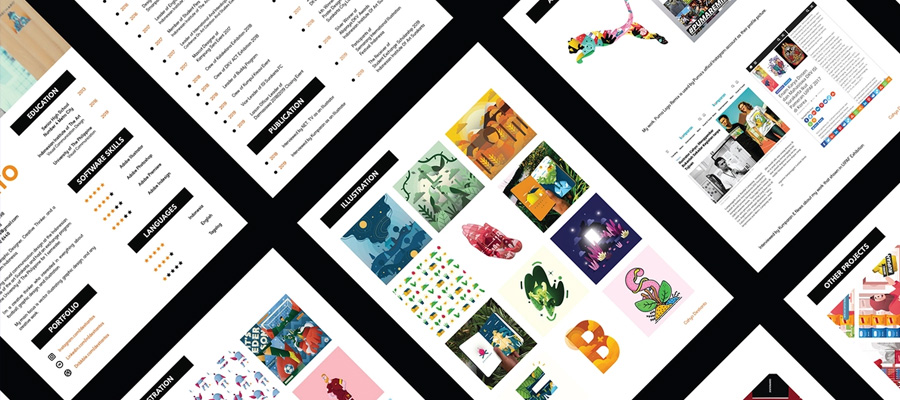Are you hunting for the perfect job? You need a killer resume to make sure you're going to get it. We have seven golden rules of excellent CVs that will help you land your dream job.
Writing a good CV doesn't sound so challenging, right? All you have to do is to list your education, work experience, and skills. Well, at least that's if you're hunting for an average job or you don't really strive for a positive answer.
If you want to land your dream job, you should make the process of creating your CV more seriously. The resume is not just a list of your skills and experience. It's the overall first impression the hiring manager gets about you. Once you start seeing your resume like this, you'll understand why it is so essential to create an interview-worthy CV.

Curriculum Vitae by CAHYO DESTIANTO
So, is your resume up to scratch? Or will you be left at the bottom of the applications pile? We have seven golden rules of killer resumes that will definitely help you get the best offers!
Content
A CV is by no means a test for your writing skills. Yet, you have to do your best when writing it because it's the content that matters the most and can make your resume the ticket to an interview for the job of your dreams.
1. Use the right language.
No matter what position you are applying for, you need to adapt your writing to the right language.
What does this mean? Well, suppose you are applying for a job in sales. In that case, you should naturally include buzzwords from the industry in your resume, such as "prospecting" or "cold-calling". If you are hunting for a job in marketing, use specific terms like social media, e-commerce, ROI, or SEO. By adapting your writing, you're making yourself a relevant candidate for the job position because it shows that you have experience in the field.
Besides that, you should also use strong action verbs like "collaborated", "helped", "coordinated", "planned", or "managed". Action verbs will help you show off your duties or accomplishments.
2. Use the right tenses.
There's really not much to say about this one because it's a thing of basic English skills. The rules are simple:
- If you talk about current roles, make sure you use present tense (manage, organize, plan).
- If you talk about previous roles, make sure you use past tense (managed, organized, planned).
3. Have a simple structure
When writing your resume, you should also pay attention to the structure you are using in order to make sure you don't bore the reader or make them feel like it's too difficult to read your CV. More precisely, use a simple structure that the reader can follow.
Plus, think about it: the hiring manager needs to go through dozens, if not hundreds of resumes in a couple of hours. They don't really have the time to follow a complex structure with long boring paragraphs. So, your CV will likely end up at the bottom of the applications pile.
To avoid that, use a simple structure like bullet points.
Bullet points are easy to read and follow, and they actually have a bigger impact as they highlight each of your skills or achievements. What's more, they help avoid making your resume unnecessarily longer.
Editing
Once you're done writing your CV, it's time to edit it. Edit it? Absolutely! You should never simply forward your resume to the hiring manager of your dream job immediately after you've finished writing it. There are more steps to take to ensure that you have a killer CV.
4. Eliminate filler words and repetitions.
Filler words and repetitions affect the quality of your CV's content. Plus, they can be a sign for the hiring manager that you didn't have that much to say about your experience and skills, and you just repeated yourself to make your CV look longer.
Don't leave those filler words and repetitions in your resume. Read it a couple of times and eliminate them from your content.
5. Check for spelling and grammar errors.
This one is a biggie! Some recruiters may discount your resume the second they find a spelling or grammar error in your CV. Even if they might realize that is just a simple mistake, the fact that you didn't take the time to double-check your CV for such mistakes will make them throw your resume at the bottom of the pile.
So, once you are done writing your CV, make sure that you read it over several times and you should even ask a friend to take a peek as well.
Formatting
You're done writing and editing your resume? Before sending it, there's one more step to take: formatting your CV.
6. Stylize your text.
This is all about how the final version of your CV will look like. Here are some tips:
- Pick a font and stick to it on the whole document.
- Include your contact details in a header format.
- Format section headings to be slightly larger than the rest.
- Add a blank line before and after each heading.
7. Send your resume as a PDF.
If you're still on the fence about PDF and Word resume formats, pick the PDF one. When you save your resume as a PDF, it freezes as an image, meaning that you can be 100% sure that the hiring manager will see the exact formatting you see on your computer. If you send it in other formats, it's very likely for the style, the fonts, and so on to change when the recruiter opens it.
Even if after you transform your CV into a PDF file and you notice that it needs one more edit, it's easy to do so with a PDF editing tool.
General advice
Keep in mind that hiring managers must go through plenty of CVs when there's an open position in their company. So, on average, they spend about 6 seconds to scan a resume and see if the candidate is suitable for an interview. Since you have about 6 seconds to convince them you should be among those candidates, don't use your CV to make a list of everything you have ever done. Instead, make a brief presentation of your most relevant experience and skills for the position.





















